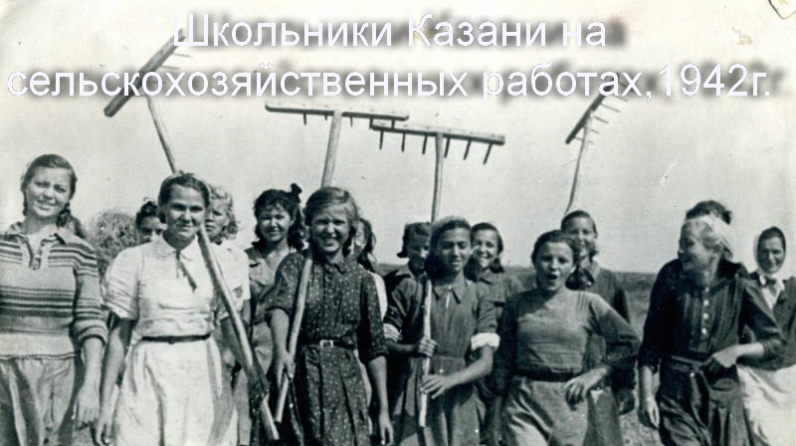The contribution of rural women and children of Tatarstan to the Victory in the Great Patriotic War

The Ministry of Agriculture and Food of the Republic of Tatarstan continues a series of publications devoted to the agriculture of the TASSR during the Great Patriotic War. During the war years, Tatarstan became especially important in the food supply of the army and the population. Moreover, women became the leading force in the agrarian sector of Tatarstan during the war years. In the collective farms of Tatarstan, they worked out up to 70–75% of the total number of workdays, they also made up 75% of the permanent working state farms.
Child labor was especially widely used for weeding, haying, threshing, harvesting, etc. The school year in rural schools began later.
Amina Yunusova from Tenkovsky (now - Verkhneuslonsky) district of Tatarstan remembered: “From the age of 12, when the war started, we worked on a collective farm for three months every year. We woke up at 3-4 o'clock in the morning. Waking up was hard. We performed various jobs. I remember how we worked on the haymaking: the boys mowed, and we first smashed huge stacks of hay to dry them before lunch, then turn them over, and in the evening we collected them again in stacks. In a day, you’re so fuzzy that you barely drag your feet home in the evening.
.jpg)
The catastrophic situation in agriculture of Tatarstan was observed with mechanization personnel. After the mobilizations carried out in the country, there were extremely few people left who could handle the equipment. Under these conditions, substantial support was provided to the agrarian sector by women who received mechanization specialties in the prewar period. However, it was not possible to cover the loss of machine operators only with the help of previously trained personnel, in connection with which the regional committee of the CPSU ordered the organization of short-term courses of machine operators. Wartime print widely covered positive examples of such undertakings. In particular, in the republican press the following notes were rather typical: “The girls are the Stakhanovists of the collective farm named after Stalin of Arsk District M.Karimullin, M.Sharafeev and M.Asadullin learn courses at the Arsk MTS and prepare to lead powerful steel horses. ” The proportion of women in the tractor drivers in the Tatar ASSR during the war years rose from 21 to 73%, combine operators - from 26 to 79%.
Another acute problem in the agriculture of the republic was the insufficient number of managerial personnel. Already in 1941, out of 3884 chairmen of collective farms of Tatarstan, 2,586 people were called to the front. This work was taken under the control of the political departments recreated in the village by a special resolution of the Central Committee of the CPSU in the autumn of 1941. For the 1942, 2,760 people were promoted to chairmen of collective farms, including women. Their number among the chairmen for the war period increased from 19 to 320, among the foremen of field brigades it increased from 150 to 6327, among heads of livestock farms from 747 to 2575.
The work of rural women and children of Tatarstan was really hard, but at the same time very important and necessary. The food supply of the army and the population for the most part laid on the fragile female and immature children's shoulders. Their selfless work on the fields of the republic has become a great contribution to the Victory in the Great Patriotic War!